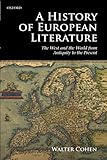A history of European literature : [electronic resource] the west and the world from antiquity to the present / Walter Cohen.
Material type: TextPublication details: Oxford, United Kingdom : Oxford University Press, 2017.Description: 1 online resourceISBN:
TextPublication details: Oxford, United Kingdom : Oxford University Press, 2017.Description: 1 online resourceISBN: - 9780198732679
| Item type | Current library | Call number | Status | Date due | Barcode | |
|---|---|---|---|---|---|---|
| E-Resources | Main Library E-Resources | 809.894 W231 (Browse shelf(Opens below)) | Available | E002486 |
I. Introduction -- Part 1: Antiquity -- 2. The old world literary system -- 3. Empire and its discontents in classical Latin -- Part 2: The vernacular: from the Middle Ages to early modernity -- 4. The vernacular -- 5. Medieval epic -- 6. Medieval lyric -- 7. Medieval narrative after 1100 -- 8. Language, literature, and popular culture in the Age of Reformation -- Part 3: Early modernity -- 9. The representation of empire in the Renaissance, 1: Europe and the Mediterranean -- 10. The representation of empire in the Renaissance, 2: global perspectives -- 11. Eurasian literature through the eighteenth century -- Part 4: Modernity -- 12. Nineteenth-century poetry: romanticism and after -- 13. Nineteenth-century fiction -- 14. Jewishness and modernist fiction -- 15. World literature and contemporary fiction -- 16. Conclusion.
Walter Cohen argues that the history of European literature and of each of its standard periods can be illuminated by comparative consideration of the different literary languages within Europe and of the relationship of European literature to world literature. The global history of literature from the ancient to the present can be divided into five main, overlapping stages. European literature emerges from world literature before the birth of Europe-during Antiquity, whose Classical languages are the heirs to the complex heritage of the Old World. That legacy is later transmitted by Latin to the various vernaculars. The distinctiveness of this process lies in the gradual displacement of Latin by a system of intravernacular leadership dominated by the Romance languages. An additional unique feature is the global expansion of Western Europe's languages and characteristic literary forms, especially the novel, beginning in the Renaissance. This expansion ultimately issues in the reintegration of European literature into world literature, in the creation of today's global literary system.
There are no comments on this title.

